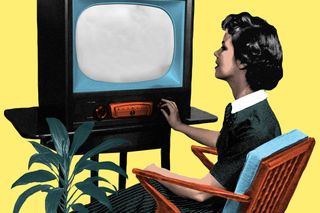
Is This Normal? 'I Enjoy Watching Movies, TV Shows By Myself'
Watching movies alone allows one to escape the discomfort one might experience in group settings that hinder their ability to enjoy what they're watching.

In this series, we dig into our strange phobias, fixations, and neuroses, and ask ourselves — Is This Normal?
I absolutely don’t enjoy movies and TV shows with company. In fact, before the pandemic, I enjoyed going to theaters alone, too – preferably on weekdays to avoid crowds. I didn’t like that strangers were around, but somehow, it was better than watching a movie I’d been looking forward to with friends and family – no matter how much I might enjoy their company otherwise. I’ve been told that’s “weird,” but I disagree; it just happens to be an uncommon approach. But does that, automatically, make it not “normal”?
Probably the biggest reason I watch stuff alone is related to practicality – I can choose the content, time, and setting without any external influence or compromise. Living with ADHD, I tend to get distracted rather easily. If I’m on my own, I can pause, rewind, or fast forward as I deem fit – without being concerned about annoying my co-viewers. In essence, it affords me a strange degree of autonomy and control over my viewing experience that makes it significantly more enjoyable.
Watching TV and movies alone can be an expression of personal independence, too -- reminding one that they do not need constant social interaction to feel fulfilled, and providing a sense of self-sufficiency. It serves as a reminder that entertainment and enjoyment are not contingent on the presence of others, and that one can, in fact, cultivate contentment from within.
Moreover, group dynamics can be challenging when individuals have contrasting preferences -- causing them to compromise simply for the sake of watching things with others, resulting in suboptimal viewing experiences for everyone involved. Watching alone, on the other hand, allows people to explore a wide array of things catering to their specific tastes, which is especially relevant in a world with a seemingly infinite number of options. Plus, there are the notorious talkers -- companions who love a running commentary on what's going on.
Physical comfort and convenience, too, play a significant role in the preference for solitary viewing. When watching things alone, one has the freedom to choose their ideal seating, lighting, and temperature settings -- besides indulging in personal snacking preferences without consideration for others' choices, thereby ensuring a maximally comfortable experience.
One might argue, though, that there could be accommodating friends and family members who wouldn’t mind your tinkering with the surroundings, playback speeds and options every now and then. That’s indeed possible. However, if you are a compulsive people pleaser – which women are more likely to be than men – you're still going to worry that I’m inconveniencing them, and messing up their experience. Not only that, but one may constantly feel the need to check up on their company – wondering if they’re bored or triggered and would like to take a break but are hesitant to admit it, if they’d prefer to get themselves a snack or use the washroom but don’t want to interrupt the show… and so on. In time, these anxieties can get in the way of an uninterrupted and immersive viewing experience.
“I have this razor-sharp awareness which notices everything in the film worthy of noticing. And when someone is around, I get conscious, and it limits [my] awareness. Even if someone says something, it just breaks the internal rhythm I'm carrying,” an individual admitted online.
It might even be that you're a socially anxious person, or are prone to social anxiety: watching movies alone allows one to escape the discomfort one might experience in group settings, which can hinder their ability to enjoy what they're watching.
Being alone eliminates this dilemma for many – especially if they're neurodivergent and don't know it yet. I tend to “mask” around people, as a result of growing up with undiagnosed autism. When I’m masking, I’m so disconnected from myself that any opportunity for introspection and personal reflection the movie might provide is lost on me. Solitude, on the other hand, enables self-discovery and self-reflection, allowing me to explore my emotions and thoughts in response to the content in my safe, comfortable environment. This can considerably elevate one’s viewing experience – making it deeply meaningful.
Then, there are people who might fall under the category of HSPs -- short for hypersensitive persons -- and experience increased empathy. While group viewing often fosters social interaction and empathy as a result of people sharing their emotional experiences, being by oneself can allow an HSP to engage with the narratives and characters on a personal level, confronting their own biases and preconceived notions without external influences. Personally, that's something I particularly look forward to since it spells a more authentic form of empathy that’s not dictated by the need for social validation.
“I get really emotional sometimes, and I’m also quite empathetic, so I get involved with the characters in the movie… [W]ith people around me, I can't focus deeply and end up missing the whole feel of the movie,” a Quora user noted.
You might even be emotionally dysregulated – probably as a result of autism, but also common in people living with anxiety, depression, and other mood disorders. When the experience gets overwhelming, I prefer to take a break from what I’m watching every time the emotions get too much for me to handle. So, I might quit a movie or a TV show mid-way and return to it later in the week. But if I’ve committed to watching something with someone, prioritizing my emotional health mid-watch feels like standing them up.
So, while many relish the opportunity to enjoy visual narratives unfold on the screen in the company of friends and family, many – like me – cannot fully appreciate them in the presence of others. End of story. The objective, after all, is entertainment; how one achieves it is secondary.
Devrupa Rakshit is an Associate Editor at The Swaddle. She is a lawyer by education, a poet by accident, a painter by shaukh, and autistic by birth. You can find her on Instagram @devruparakshit.
Related


Woe Is Me! "My Boyfriend’s Colleagues Turned Him Into a Bigot. Can I Change Him Back?"
